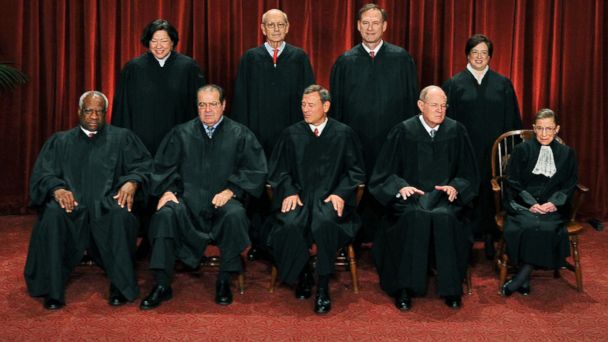Supreme Court Upholds Prayer at Town Meetings

(Tim Sloan/AFP/Getty Images)
The Supreme Court ruled in favor today of a town in New York that begins its public board meetings with a prayer.
In a 5-4 decision, Justice Anthony Kennedy wrote the main opinion saying, "Ceremonial prayer is but a recognition that, since this Nation was founded and until the present day, many Americans deem that their own existence must be understood by precepts far beyond the authority of government, to alter or define and that willing participation in civic affairs can be consistent with a brief acknowledgement of their belief in a higher power, always with due respect for those who adhere to other beliefs."
The decision was a loss for two women, Linda Stephens and Susan Galloway, an atheist and a Jew, who filed suit against Greece, N.Y., arguing that they felt coerced to participate in prayers - which are predominately Christian - and delivered by volunteers chosen by town officials. The women won their case at a lower court when a federal appeals court ruled in favor of the women, saying that the town's practice violated the Establishment Clause of the Constitution.
But today, Kennedy rejected the notion that the prayer has to be nonsectarian. "To hold that invocations must be nonsectarian would force the legislatures that sponsor prayers and the courts that are asked to decide these cases to act as supervisors and censors of religious speech," he said.
But Kennedy did lay out some constraints. He wrote, "if the course and practice over time shows that the invocations denigrate nonbelievers or religious minorities, threaten damnation or preach conversion, many present may consider the prayer to fall short of the desire to elevate the purpose of the occasion and to unite lawmakers in their common effort."
Kennedy said that "Absent a pattern of prayers that over time denigrate, proselytize, or betray an impermissible government purpose, a challenge based solely on the content of a prayer will not likely establish a constitutional violation."
He said in the Town of Greece, "in no instance did town leaders signal disfavor toward nonparticipants or suggest that their stature in the community was in any way diminished."
Richard W. Garnett, a professor of law at Notre Dame Law School, said that the Supreme Court in today's decision "re-affirmed the longstanding rule that the Constitution permits legislative prayer and does not require officials to monitor the amount of 'religious' or 'sectarian' content they contain."
Thirty years ago, the court upheld legislative prayer in a case out of Nebraska. The court said the prayer was deeply rooted in the nation's history. In that case, Marsh v. Chambers, the court said prayers are constitutionally permissible as long as they don't proselytize or denigrate any faith.
After today's decision, the Rev. Barry W. Lynn, executive director of Americans United, which sponsored the lawsuit against Greece, said in a statement that "The Supreme Court just relegated millions of Americans - both believers and nonbelievers - to second-class citizenship."
"Government should not be in the business of forcing faith on anyone, and now all who attend meetings of their local boards could be subjected to the religion of the majority," he added.
But lawyers for the Town of Greece praised the decision.
"Opening public meetings with prayer is a cherished freedom that the authors of the Constitution themselves practiced," said David Cortman of the Alliance Defending Freedom. "Speech censors should have no power to silence volunteers who pray for their communities just as the Founders did."
Justice Elena Kagan wrote the main dissent that was joined by Ruth Bader Ginsburg, Stephen Breyer and Sonia Sotomayor. Kagan noted that she agrees with the court's 1983 decision in Marsh v. Chambers but that this case was different.
"The Town of Greece should lose this case," she said, noting that the practice in Greece is different because the town's meetings involve participation by ordinary citizens, and that Greece's town board, "did nothing to recognize religious diversity."
"In arranging for clergy members to open each meeting, the Town never sought," she said, "to involve, accommodate, or in any way reach out to adherents of non-Christian religions."
If the town board had let its chaplains know that they should speak in nonsectarian terms, common to diverse religious groups, "then no one would have valid grounds for complaint," Kagan said.
"In this country, when citizens go before the government, they go not as Christians or Muslims or Jews (or what have you), but just as Americans (or here, as Grecians). That is what it means to be an equal citizen irrespective of religion," Kagan added.
Daniel Mach, director of the ACLU program on freedom of religion, said he was disappointed with the decision but does not believe it will lead to wholesale changes in the First Amendment.
"I don't doubt that proponents of government-sponsored religion will try to use the case at every turn. But, in its analysis, the decision seems limited to the context of legislative prayer that has a unique historical pedigree," Mach said.